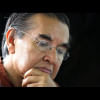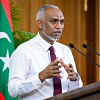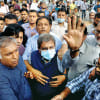Repeal DSA, amend all anti-free press laws
The government must either repeal the Digital Security Act-2018 or amend it in such a manner that it does not hamper free media or freedom of expression.
While presiding over a discussion observing World Press Day, the editor and publisher of The Daily Star, Mahfuz Anam, placed the demand.
Anam said that when the DSA was at its drafting stage, journalists identified different anti-free media provisions and raised their objections first to the government and then to the parliamentary standing committee. Nothing was done. "Later we were assured by the law minister and the information minister that the law would not be used against journalists or to suppress freedom of expression.
"Five years on we are forced to draw the conclusion that whatever their purpose [to formulate the law] was, it has been used against free journalism.
"Thus today we have no alternative but to demand its repeal," he added.
The discussion titled "Freedom of Expression is the Driver of All Human Rights" was organised by The Editors' Council (Shampadak Parishad) at the capital's Jatiya Press Club.
Addressing the discussion as special guest, Hasanul Haq Inu, chairperson of the parliamentary standing committee on Information and Broadcast Ministry, said the DSA should be reviewed and necessary amendments made to make it more press-friendly.
He called upon the government to take prompt steps in this regard.
Inu said as long as the law is not amended, filing cases under it should be based on prior approval of the home minister.
He, however, also stated that there is a need for a law in the country to fight cybercrime.
New Age Editor Nurul Kabir said the DSA has largely been used against political opponents and those who want to express their opinion freely and write about the country's declining democracy and overall deteriorating situation on human rights.
Daily Samakal Editor Mozammel Hossain said the government points to the proliferation of newspapers as a sign of press freedom, but that this is a fallacy.
"If the number of media houses is the yardstick, then the locust would have been the strongest creature on earth," he said.
Daily Ittefaq Editor Tasmima Hossain said that there is a culture of fear and even editors are a victim of it.
"There is a history of those in power taking steps that repress free media," she said. She recalled the role of legendary editor, Tofazzal Hossain Manik Mia and how he fought all sorts of oppressive steps against Ittefaq during Pakistani rule.
Senior journalist Monjurul Ahsan Bulbul said that they had told the government to remove the vagueness of certain clauses of the law several times.
"On one hand, most of the media is controlled by a select few, shrinking the space for a plurality of voices. On the other, a plethora of laws and regulations are working to restrict the media," said Bulbul.
Prothom Alo Managing Editor Anisul Hoque commented that there cannot be any terms and conditions for freedom of expression. "The American constitution states that no law can be made that hinders freedom of expression. The constitution of Bangladesh allows for certain exceptions, which parties interpret to suit their own needs," he said. This duplicity must end.
The Financial Express Editor Shamsul Haq Zahid pointed out that although the law minister had promised several times that the DSA will be amended, it has not been done yet.
He urged journalists to be united and to fight for this common cause.
Desh Rupantor Acting Editor Mustafa Mamun said, "The space for freedom of expression is so narrow that we cannot even say that we are being censored."
He said that as a result, the mainstream media in Bangladesh is losing "credibility and acceptance".
Mahfuz Anam concluded the session by placing a set of five demands, which we publish in full.
1. Stop further enacting all anti-free media laws now in draft forms. Hold talks with all stakeholders, especially representatives of journalists and media institutions, before moving forward with these draft laws.
2. Amend all existing laws that affect the functioning of the media and remove all anti-free media provisions in them.
3. Repeal Digital Security Act (DSA) or amend it in such a manner that it focuses only on clearly defined cybercrimes and does not in any way hamper the operation of free media or freedom of expression. Suspend operation of DSA till it is either repealed or amended.
4. Withdraw all cases against journalists filed under DSA.
5. Enact laws that support and nurture the growth of free media and remove the current environment of fear and intimidation.
Dewan Hanif Mahmud, general secretary of the parishad and editor of Bonik Barta, moderated the discussion, and said the World Press Freedom Day reminds every government across the globe about their commitments towards free press.

 For all latest news, follow The Daily Star's Google News channel.
For all latest news, follow The Daily Star's Google News channel. 













Comments